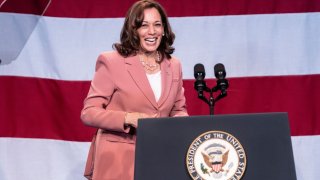U.S.-North Korea Relations Under a Harris Administration
Regardless of who wins in 2024, Harris or Trump will need to increase the bandwidth their administration can give to the Korean Peninsula.
Even before being elected in 2016, former president Trump routinely gave his opinions on every topic under the sun, including his views on North Korea, thus providing the public with a deep well of evidence to infer future policies. Vice President Harris, on the other hand, spent much of her career in local and state offices before serving four years in the Senate. There, she largely focused on domestic policy issues such as criminal justice reform, immigration, and Trump’s impeachment.
As vice president, her job was to support President Biden and his policies, not to chart her own course. And so, there is a scarcity of foreign policy views attributable to Harris from which to craft a clear idea of how she would steer future U.S.-North Korean relations should she win the presidency. During a 2022 visit to South Korea, Harris remarked that the United States and South Korea were united in the goal of the “complete denuclearization of the Korean Peninsula.” But that has been standard U.S. policy across multiple administrations.
One might assume that a Harris administration is likely to continue Biden’s “calibrated and practical” approach to Pyongyang at first. But with the growing relationship between North Korea and Russia, a President Harris may not have the luxury of continuing Biden’s benign neglect of the country as North Korean-produced weapons explode over Ukrainian battlefields.
Harris’s career does indicate that she is not afraid to upset the status quo or work across the aisle to accomplish a goal. This is a trait she will need in order to shake up the American national security and diplomatic communities from their ossified thinking. Past approaches continually yielded policies like the ineffective “strategic patience,” which saw North Korea test nuclear weapons in 2013 and 2016 under President Obama. Communities that likewise weren’t able to adapt to former President Trump’s own engagement tactics, as North Korea continued WMD and missile development throughout his term.
In fairness, it must be noted that both Presidents Trump and Biden were dealt incredibly difficult hands, and much of their attention was required for domestic problems. Regardless of who wins in 2024, Harris or Trump will need to increase the bandwidth their administration can give to the Korean Peninsula.
Should Harris have the focus, then a wide range of options emerge beyond the all-or-nothing demand for complete, verifiable, and irreversible denuclearization. From arms limitations and stopping Pyongyang from transferring nuclear technology abroad to cracking down on illicit funding mechanisms and re-engaging with China to reestablish stability on their border—Harris has the opportunity to move the ball forward.
We may glean some insight into whether she might handle Pyongyang differently than previous presidents by looking at her actions and words in other areas. Regarding the Israel-Gaza conflict, her willingness to show light between herself and President Biden has caused controversy within some partisan circles. Still, it also shows that she will advocate for her own beliefs even if it places her at odds with others.
In her remit to address the root causes of illegal immigration (often referred to as a “border czar”), Harris worked with the leaders of the Northern Triangle countries of El Salvador, Honduras, and Guatemala to stem the tide. Although her success rate has been debated, she showed that she was nonetheless willing to put in the work and seek to solve the origins of illegal immigration, not merely its symptoms.
Will a President Harris be capable of dedicating the time and effort needed to make progress regarding North Korea? If she is to be able to, she’ll need to chart a more independent course than what has traditionally been tried. And she will need to understand the root causes that have led the world to this point, as well as recognize that Pyongyang will reject Western demands for immediate denuclearization—something North Korea experts broadly agree doomed the 2019 Hanoi Summit.
What is certain about Harris’ policy toward North Korea is that there will be no “love letters” exchanged with Kim Jong-un.
Jacob Bogle is a U.S.-based, independent North Korea analyst and the creator of AccessDPRK, the most comprehensive, publicly available mapping project on the country.
Image: Lev Radin / Shutterstock.com.

